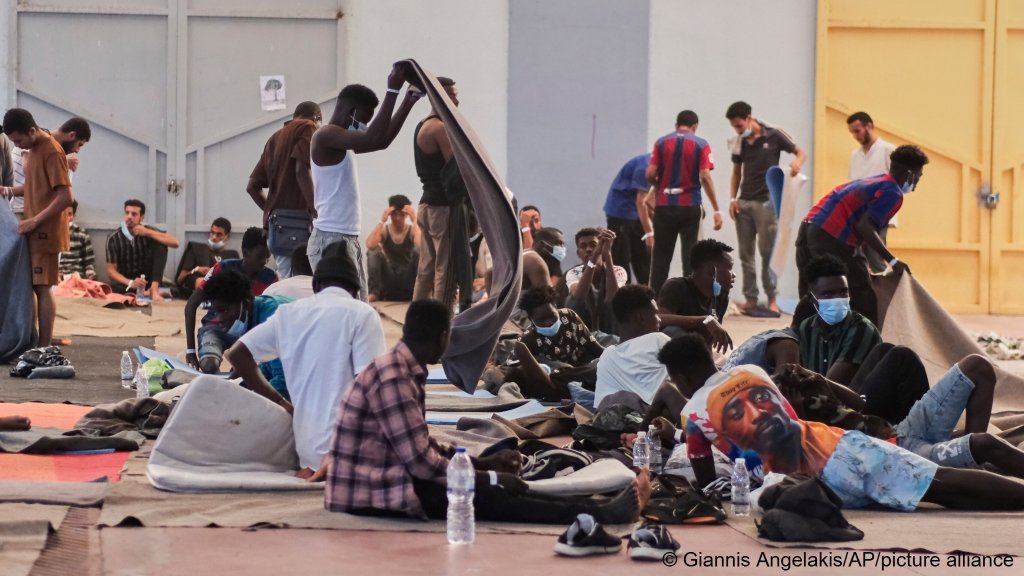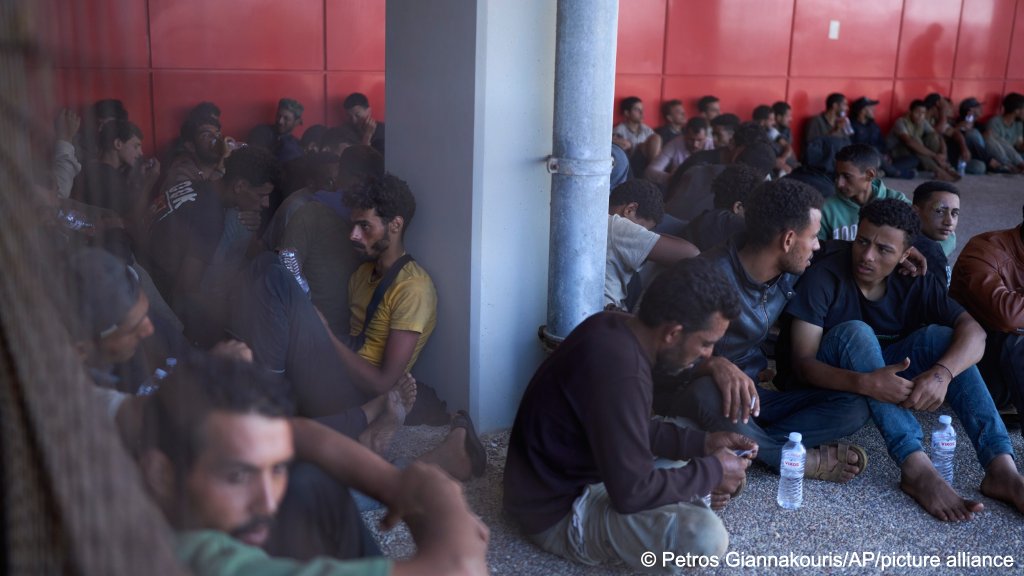Over the weekend, hundreds of migrants continued to reach the southern Greek island of Crete, according to media reports. The Greek coast guard had to assist around 800 migrants who managed to reach the nearby small island of Gavdos, moving them to reception centers on Crete itself, which have been suffering severe overcrowding and unsanitary conditions in recent months.
The Greek coast guard says that the majority of migrants who arrived at the weekend reportedly set off from the Libyan port city of Tobruk in the east of the country near its border with Egypt, adding that they had set off in a number of fishing boats, traveling 300 kilometers (about 165 nautical miles) in almost a straight line.
The majority of them were young men, who — according to a coast guard statement — come from several North African countries.
The Libyan city of Tobruk is not under the control of the country's internationally recognized government based in Tripoli, which makes it more difficult for the Greek government as well as the EU to work with local administrators tasked with trying to reduce the number of migrants arriving in Europe.
In recent weeks, both the EU and Greece have tried to approach the de facto administration of the east of the country, headed by General Khalifa Haftar, to seek solutions together.
Discontent with the current state of affairs on Crete is now spilling over from the migrant population to the locals tasked with taking care of them, report local Greek news sources.
Read AlsoGreece: Libyan coast guard officials receive training
Crete: Overwhelmed, overstretched and overburdened
Crete's temporary camp in Agia, located near the city of Chania, has meanwhile been facing overcrowding since a major increase in arrivals — mainly from Libya — earlier in the year.
The latest arrivals have once more fueled pre-existing tensions.
Local authorities bemoan the unsanitary conditions at the Agia camp, as this first arrival center was only ever intended to be used for short stays; however, according to the Greek coast guard, there are now multiple instances of migrants being kept there for "weeks."
According to reports on the Greek public broadcaster ERT, the number of irregular migrants on Crete is currently about 1,150, marking a sudden rise after a gradual decline in recent weeks.

Read AlsoLibya: Nearly 15,000 migrants intercepted and returned since start of the year
Government once more in crisis talks
Some of the main problems reported at the camp include inadequate sanitation and the spread of diseases such as staph infections (bacterial infections that normally begin on the skin, but can become serious if spread to the bones or blood), according to information made available by the coast guard officers' union.
Local news outlets also highlight in this context that on average, per 80 migrants there's only one ablution facility available.
With temperatures easily soaring above 35 degrees Celsius, the lack of air conditioning has also been flagged as a major shortcoming for those housed in the center.
Tensions among the migrants have reportedly been running high, as Greek authorities scramble to try and move them to other centers on the mainland, which are better equipped to address their immediate needs.
The latest Greek media reports state that hundreds of migrants will now be taken to the Greek mainland imminently, as an emergency government meeting is underway in Athens to seek sustainable solutions.

Port workers union fed up with stepping in
Meanwhile, the port workers' union in Crete published a statement on September 12, highlighting further malpractices, which are not only affecting migrants:
In the document, they bemoan the fact that migrants "often go on hunger strikes, or instigate mass protests, brawls and attacks among themselves, creating explosive situations on a daily basis that are managed by colleagues without any protection and no training for such conditions."
The same statement also says that in the absence of proper staffing at the reception center, port staff "are called upon daily to perform services that are not part of their responsibilities, in dangerous, inhumane and humiliating conditions."
"The truth is: we have turned into waiters, nurses, psychologists and ambulance workers instead of doing our duty," the statement further explains, adding that the current state of affairs had "exceeded all limits of endurance and tolerance."
Read AlsoGreece approves a three-month suspension of asylum claims
Local government running out of funds
Officials working at the Agia camp, who are not affiliated with the coast guard nor the port workers' union, have also warned that the situation was spiralling "out of control" amid severe understaffing, saying that there was one person in charge for every 100 migrants.
The local government of Chania also said that the situation is placing a considerable financial strain on it, with a city spokeswoman expressing concern on local media that more arrivals could likely ensue in coming weeks with the weather cooling down.
Meanwhile, the Red Cross has announced that it will be withdrawing any services it had been providing at Agia immediately as well, which is expected to further exacerbate an already difficult situation; the reasoning behind the withdrawal, however, remains unclear.
Read AlsoGreece: Migrants on deportation list to wear ankle tags
Crete now the main point of irregular arrivals
According to the UN Refugee Agency (UNHCR), almost 12,000 migrants have arrived on Crete so far this year, mainly departing from North African shores; this marks an increase of over 300 percent compared to the same period last year.
Compared to all arrivals on Greek territory, based on UNHCR data, well over a third of all arrivals to date this year have been on Crete and its small sister island, Gavdos.
The recent rise in arrivals comes despite a suspension on processing asylum applications for people arriving by sea, which has been in effect for over two months now.
Provisionally planned to be in place for three months, the suspension might be extended before expiring on October 11.

Read AlsoGreece: Refugee council challenges asylum freeze
Athens has also recently passed new legislation criminalizing unauthorized stays in Greece for rejected asylum seekers.
Under the law, people without a right to stay in the country will either be forced to take part in voluntary departure programs or face imprisonment for a minimum of three years.
The measure has been met with criticism, but the Greek Migration Ministry says that it is designed to protect public order and ensure national security.
Read AlsoDetention and fines at core of Greece's new migration law
with dpa
